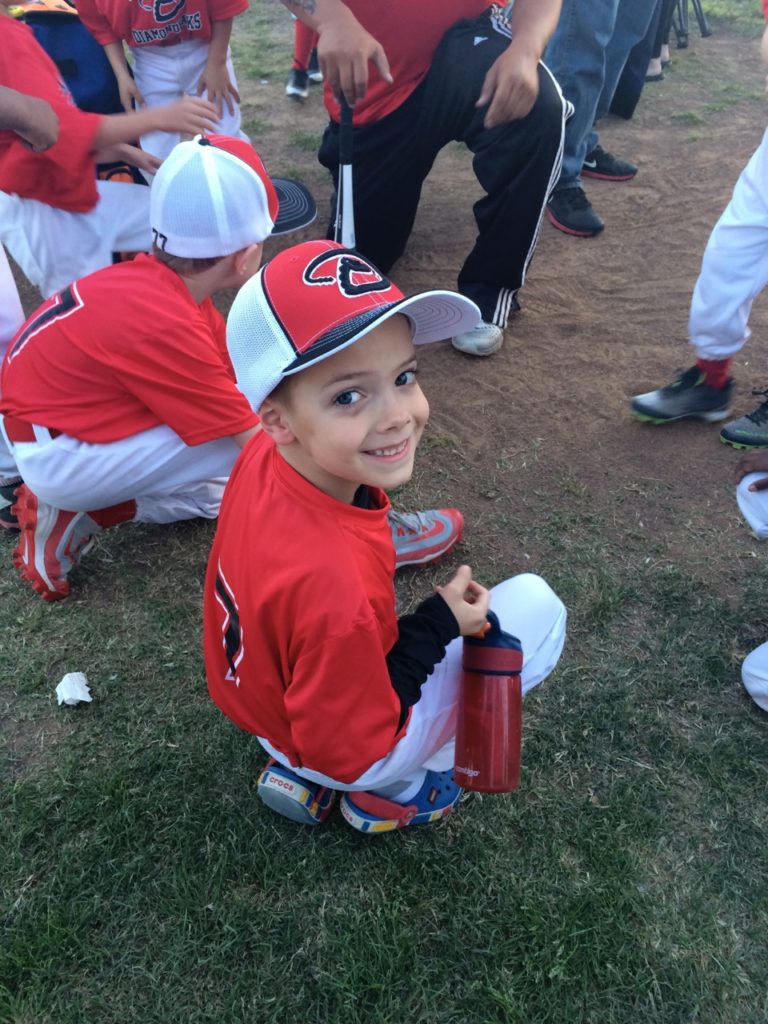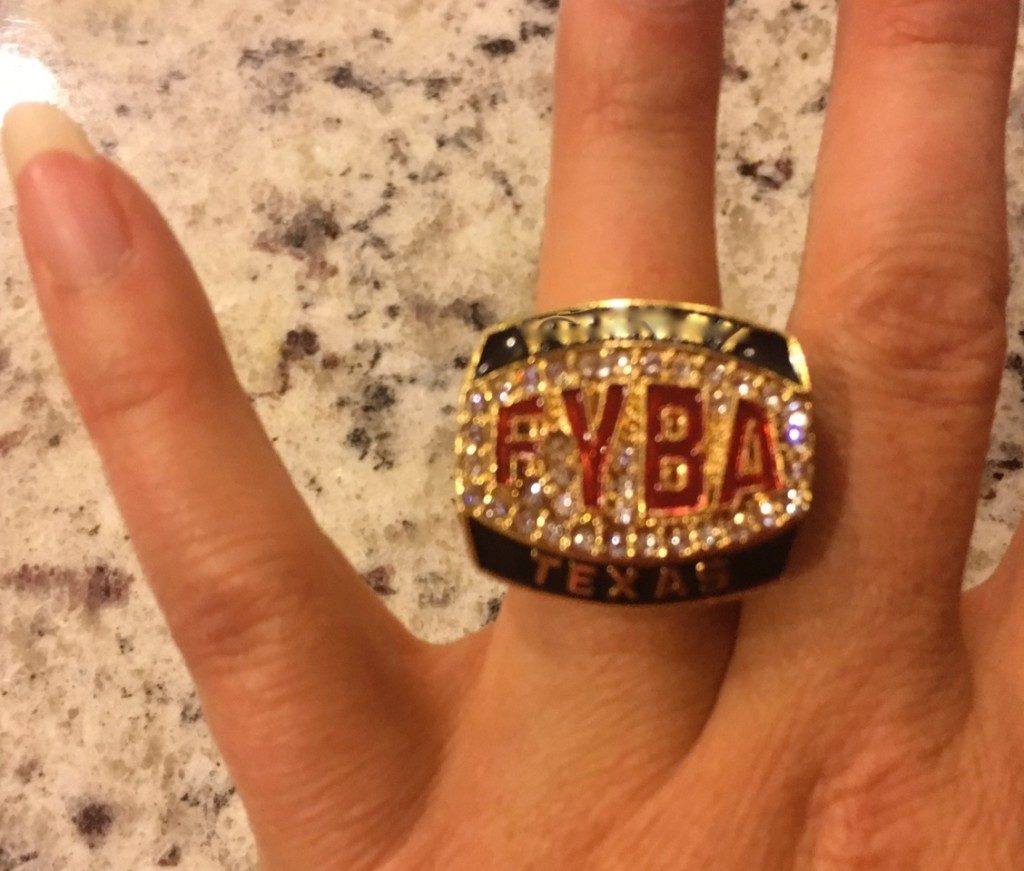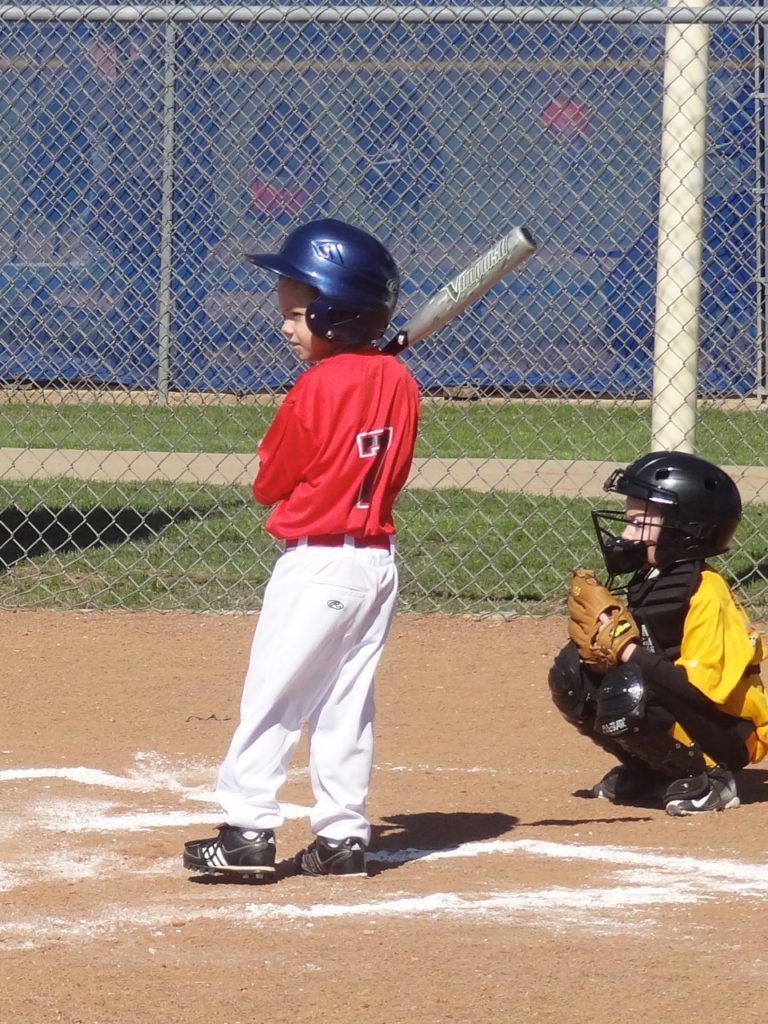My son played one season of rec baseball and then got cut from the team. He’s only six-years-old. Will youth sports ever be just for fun, again? Has the insanity of the youth sports culture gone too far?
“I apologize to inform you of this news . . .we have picked up new kids from other areas that were a better fit for the more competitive team we are trying to organize. Our roster is full.”
That’s how the text—sent to my husband and four other parents—read. We wouldn’t be able to sign our son up to play on the same baseball team next season. He had been cut.
He’s only six.
I’ll admit this Texas sports culture is somewhat new to us. Both over forty and raised on the East Coast, my husband and I didn’t start playing competitive sports at age four. Little League, in our hometowns, was for learning the game and having fun. The real competition started when you made the junior high team. Out-of-town tournaments were for high school age kids. Recruiting was a word reserved for college students.
My, how things have changed!
First Season Jitters
Our entry into youth sports began last Spring, when we signed up my middle son for rec baseball in our small Dallas suburb. We had no expectations of greatness. This was his first year playing any sport. He showed some hitting aptitude but we didn’t assume he’d become a superstar. Our goal was for him to have fun and make friends. His extroverted nature insured that at least the latter expectation would be met.
He knew no one on the team, but showed up smiling regardless. I nervously stood on the sidelines and watched his very first practice. He had no idea what to do. When the coach said to “huddle up” or “run the bases” he and a handful of other kids just stood there—confused. Though they were never offered any definitions or technical instruction, eventually they caught the rhythm and language of the game. Apparently by age six a boy should just know the grammar of baseball.
He looked so cute in his uniform. (Though I wanted to start a coup against the coach who chose white pants with red shirts. Hello? That requires separate loads of laundry. Ugh!) But that first game made him nervous. “Mommy, my stomach feels funny.” He whispered to me before his first real game. I explained how our bodies act when we feel anxious. Truth is, my stomach felt funny for him too. That first “at bat” in any arena of life feels like cliff jumping.
From Good to Great
His team seemed solidly average. Somehow they managed to win each game by a run or two. As new baseball parents, we didn’t know which teams were “good” and which were “average,” we only knew there were “better” teams in the league because coach mentioned them. A lot. “They’ve been together since they were age four.” He’d tell the boys. They nodded as if they understood the significance.
 When we played these teams, I watched other coaches verbally rip apart the little boys for sins such as missing a fly ball or using the tee (at this age they get three pitches from their own coach and then the chance to use the tee). I felt relieved that we hadn’t been assigned to one of these teams. If coach pressure and a cutthroat environment accompanied a “great” team, we weren’t interested.
When we played these teams, I watched other coaches verbally rip apart the little boys for sins such as missing a fly ball or using the tee (at this age they get three pitches from their own coach and then the chance to use the tee). I felt relieved that we hadn’t been assigned to one of these teams. If coach pressure and a cutthroat environment accompanied a “great” team, we weren’t interested.
My son’s baseball nerves subsided and his confidence grew—as did his baseball skills. He earned a game ball twice—one time for hitting without the tee and another for hitting the game winning RBI against the best team in the league. He wasn’t the team’s best player, but we were proud of the way our little first timer embraced the game.
Baseball Mom Alert
I’ll confess: I started getting into it. I had only heard negative things about Texas youth sports. Yet after a few months of cheering for our boys, I seriously considered getting a “baseball mom” tee and having it bedazzled with rhinestones.
Towards the end of the season, our team’s play caught fire. I stood on the sidelines jumping up and down with excitement as the team beat that “great” team with the mean coaches. I longed to see these coaches humbled by a loss. They needed to learn that winning wasn’t everything. (And, shamefully, I prayed my child would teach them this lesson. {Head slump and sigh.})
Then, somehow, the season finished with our team on top. With the best record in the league, the boys were awarded championship rings.
Yes. You read that correctly. Rings. Rings that won’t fit their fingers until they are seventeen. I’m sure they’ll wear them then to relive the glory days of their awesome six-year-old tee ball team.
 This may be one of the only times in my life when I literally laughed out loud.
This may be one of the only times in my life when I literally laughed out loud.
Time to Retire the Jersey?
But yesterday we got that text. And now I get to explain to my little guy that if he’s going to play baseball next Spring he’ll have to start all over. New uniform, new number, new coach, new team. He’s so social he may not care. He’s pretty proud of that gaudy championship ring. But he also thought his team was the greatest—not because of their winning record but because of his friends. At a minimum, I know he’ll wonder why he’s not part of his old team when his new team plays them next season.
The more people I vent to, the more I find that our story is common. Seven-year-old girls get booted from softball teams and moms of five-year-old boys annually shell out another $45 for a new uniform because their “old” team decided to head for greatness. (They don’t need any sub-par tee ball tots dragging them down.)
I wonder: Can we ever go back? Will it ever stop?
Out of Our League
We can change league rules, educate about the actual number of youth sports players who will ever be able to get college scholarships, or try to ignore this folly and encourage our children to keep playing, “just for fun,” no matter how many times they have to change teams. But, I don’t think any of this will actually work.
Why? Because the problem rests in the hearts of the parents. I’m not pointing any fingers, here. I’m to blame too.
When I was in my twenties I drove to Williamsport, Pennsylvania—home of Little League baseball—to meet with some of their executives. At the time, I worked for a group called the National Fatherhood Initiative. We attempted to help Little League solve one of their biggest problems: Parents. Dads got too angry when their kid struck out. Dads yelled when they didn’t like the ump’s call. Moms put to much pressure on their young-ins to perform well. Parents were zapping the fun out of the game of baseball, and the league wanted resources to help them chill.
At the time I didn’t fully get it. I couldn’t. Why would a parent get so caught up in their child’s sports? I’d never be that zealous about kids’ sports, I vowed.
 But, now that “mom” is my primary title, I see how it happens. It’s easy to protest the team turning “competitive” until it’s your child chosen for “select” play. When someone in the know says, “We see a lot of potential in your son . . .He could really go places in this game.” It’s harder to reply with, “No, they should just be having fun at this age.”
But, now that “mom” is my primary title, I see how it happens. It’s easy to protest the team turning “competitive” until it’s your child chosen for “select” play. When someone in the know says, “We see a lot of potential in your son . . .He could really go places in this game.” It’s harder to reply with, “No, they should just be having fun at this age.”
What if my child is the next Derek Jeter? We really should make sure he’s on a team where his skills are honed and developed. His future is at stake.
I fully acknowledge the parenting dilemma that’s presented in these scenarios.
But, can I ask you a personal question? What were you doing at age six? Aside from what you learned in school, did your extra curricular activities as a six-year-old shape the life you live today?
I doubt it.
Stuck in a Youth Sports Rut
So why are we stuck here? It’s called idolatry. Our culture breeds in our hearts a thirst for our children to achieve greatness, to make a name for themselves, to find success and fortune. We envision ourselves sitting for the interview with ESPN. We see ourselves sharing the pictures of eight-year-old Johnny before he made it to the big leagues. We fantasize about what life will be like, for ourselves, when our kid makes it in the sports world.
We’re ridiculous.
We need to let go and let them be children.
Only 2 in 100 young athletes will ever get a college scholarship. Of this group, an even smaller percentage will go on to have an amazing Major League career.
The chance at defying these odds is slim. But, what will happen, for sure, if we continue this youth sports nonsense, is that your child will be over-trained in one sport at way too young of an age (furthering the odds that he’ll never play a game in a real stadium later in life.)
Extra benefits may also include burnout or anxiety from the pressure to compete and win at such a young age or fatigue from spending every spare minute on the baseball field. Yet another bonus could be suffering grades and family life.
Families who prioritize youth sports make a commitment to put their child’s team above all other activities. First grade end-of-year school program on the same night as a baseball game? You’ve gotta choose baseball or the whole team will be let down. Outside friendships, church, and all other activities must not interfere with the commitment you’ve made to sports.
Stop the madness.
Authors Margot Starbuck and Coach David King do a good job at encouraging parents who want to keep their sanity in the world of youth sports. The book, Overplayed, sets guidelines for parents to help their children participate in youth sports in a reasonable and healthy way.
My thought? We parents need to get a grip on reality. We need to let go of this cultural myth that we need to raise superstars and just let our children be, learn, grow and play. Yes, there are great lessons to be learned in youth sports. But, healthy children are well-rounded.
In fact, meals around the table with family are scientifically proven to be one of the best things you can do to keep your children happy, healthy, and away from risky activities like drug use, depression or eating disorders. How many family meals are missed each week because of youth sports schedules? Hmmm. . . Take that overzealous youth sports enthusiasts.
Of course, I’m also one of those homeschool moms who believes children need more freedom anyway. But, I see a generation of stressed out, zoned out children who need to be outside, engaged in organized physical activity, without the pressure to be awesome.
As for our path, we’ll try baseball again next season with another team. I’ll refrain from buying any flashy baseball mom tees until I’m sure he really still likes it. But if the new coach adds an extra practice each week or tells us we can’t go on a family vacation because we’ll miss a seven-year-old’s baseball game, we’re out. Youth sports won’t rule our home, no matter how big the championship rings are.
*****
 Heather Creekmore (former Dallas Moms Blog contributor) writes and speaks hope to a woman’s struggle with beauty in a culture of impossible standards. She’s married to Eric, a fighter-pilot-turned pastor, and called “mom” by four little people she birthed in just five years. Heather spent more than a decade working in politics and for non-profit causes before she started writing during naptime. As a certified group fitness instructor, Heather’s work in gyms has also allowed her to directly encourage women who wrestle with the way their bodies look. You can follow her blog at www.ComparedtoWho.me. Her first book titled “Compared to Who?” will be released next June.
Heather Creekmore (former Dallas Moms Blog contributor) writes and speaks hope to a woman’s struggle with beauty in a culture of impossible standards. She’s married to Eric, a fighter-pilot-turned pastor, and called “mom” by four little people she birthed in just five years. Heather spent more than a decade working in politics and for non-profit causes before she started writing during naptime. As a certified group fitness instructor, Heather’s work in gyms has also allowed her to directly encourage women who wrestle with the way their bodies look. You can follow her blog at www.ComparedtoWho.me. Her first book titled “Compared to Who?” will be released next June.













